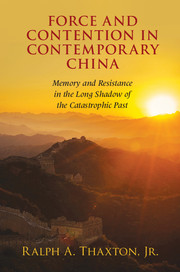With democratic elections scuttled, villagers had to find ways to make higher-ups aware of their grievances. In the mid-1990s, Da Fo's people joined a growing chorus of protesters who engaged in petitioning county, provincial, and national ruling groups to voice their claims. In time, petitioning evolved into a protest movement that occupied center stage in the contentious resistance of rural people. In rural Henan province and Da Fo village, people from all walks of life turned to this form of protest, an important subset of them consisting of survivors of the Great Leap famine.
The petitioning system in China had deep historical and cultural roots. Partly through struggle and partly though dynastic practice, rural people had established their right to petition the powerful. Confucian writings portrayed the common people imploring the emperor for redress of grievances by submitting petitions, sometimes hovering outside the imperial palace with their letters and memorials. As one reform-era Chinese lawyer who had experience in helping petitioners put it, the common people did not always have a sophisticated understanding of the law, but they knew they could petition, and they subscribed to the Confucian notion that appealing to higher-ups in a deferential manner would result in fair treatment.
In the Hebei-Shandong-Henan border area, this ageless petitioning system lasted into the Republican period. Between 1931 and 1935, for example, minor gentry, small landholders, schoolteachers, and semi-peasant salt makers in scores of villages successfully petitioned the Dongle county magistrate over the illegal, violent intrusions of the Central government's salt-tax police into the household-centered economy of earth-salt producers. Da Fo's semi-farmers made an important contribution to thwarting the expansion of Kuomintang Central government fiscal controls. Apparently, the petitioning system, in combination with popular collective action from below, worked rather well into the middle years of the Republic of China, when the Japanese invasion destabilized the Nationalist government and introduced the savagery and chaos that gave the Mao-led Communist Party its chance to seize power through agrarian-based insurgency.
The petition system was revived in the reform era. Supposedly, the Chinese Communist Party (CCP) leaders in Beijing wanted to use it to provide rural people with the institutional means to remonstrate against the wrongdoings of local government officials and, simultaneously, to generate accurate, ground-level information about popular grievances in the countryside.

